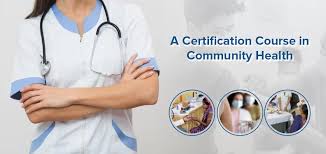
Certificate in Community Health ( 6 MONTHS )
A Certificate in Community Health is a short-term program designed to equip students with the knowledge and skills required to work in community health settings. The duration of this course is typically 6 months and focuses on improving health at the community level through education, prevention, and care strategies.
Here’s a general outline of the curriculum and key aspects of the Certificate in Community Health (6 months):
1. Overview and Objective
The program is designed to:
-
Equip students with foundational knowledge in public and community health.
-
Train students to promote health and prevent diseases at the community level.
-
Prepare individuals for roles in health education, health promotion, and community-based healthcare.
2. Course Structure
A typical 6-month Certificate in Community Health may cover the following topics:
Module 1: Introduction to Community Health
-
Definition of Community Health: Understanding the concept of community health and its importance in society.
-
Scope and Significance: Key principles of community health and its role in improving public health.
-
Public Health vs. Community Health: Differences and interrelations between public health and community health.
-
Health Determinants: Social, economic, and environmental factors affecting health at the community level.
Module 2: Health Education and Promotion
-
Health Education: Methods and strategies for educating communities about health issues.
-
Health Promotion: Key principles of health promotion and behavior change.
-
Health Communication: Techniques for communicating health messages to different groups.
-
Designing Health Programs: Creating community-based health programs focused on disease prevention and healthy living.
Module 3: Disease Prevention and Control
-
Preventive Health: Introduction to primary, secondary, and tertiary prevention strategies.
-
Infectious Diseases: Basics of controlling infectious diseases (e.g., tuberculosis, malaria, HIV/AIDS).
-
Non-communicable Diseases (NCDs): Prevention and control strategies for diseases like hypertension, diabetes, and cardiovascular diseases.
-
Vaccination Programs: Understanding the role of immunization in public health.
Module 4: Maternal and Child Health
-
Maternal Health: Importance of maternal health and reducing maternal mortality rates.
-
Child Health: Promoting the health of children, including vaccination and growth monitoring.
-
Nutrition: Role of proper nutrition for maternal and child health.
-
Family Planning: Awareness about family planning methods and their impact on community health.
Module 5: Environmental Health
-
Environmental Factors: How the environment (water, sanitation, air quality) impacts health.
-
Water, Sanitation, and Hygiene (WASH): Basics of improving water quality, sanitation, and hygiene practices.
-
Waste Management: Health implications of poor waste management and solutions.
Module 6: Health Systems and Services
-
Healthcare Systems: Overview of primary healthcare systems, government and NGO health services.
-
Community Health Workers (CHWs): Roles and responsibilities of community health workers in healthcare delivery.
-
Healthcare Access: Ensuring equal access to healthcare services for all community members.
-
Referral Systems: Understanding how patients are referred between healthcare levels.
Module 7: Social and Behavioral Aspects of Health
-
Social Determinants of Health: How factors like education, income, and living conditions affect health.
-
Cultural Influences on Health: Understanding the role of cultural beliefs and practices in health behavior.
-
Behavioral Change: Strategies to encourage health-positive behavior changes in communities.
Module 8: Community Health Research and Data Collection
-
Community Health Research: Methods for conducting research on community health issues.
-
Health Surveys: Tools for gathering health data from community members.
-
Data Analysis: Basic understanding of analyzing and interpreting health data for community planning.
3. Practical Components
-
Community Health Fieldwork: Practical experience through internships or fieldwork in local communities to observe and implement health programs.
-
Health Awareness Campaigns: Students may work on projects promoting health education, such as campaigns on hygiene, vaccination, or nutrition.
-
Case Studies: Analyzing real-world community health cases and developing solutions.
4. Learning Outcomes
By the end of the program, students will:
-
Understand the key issues affecting community health and public health systems.
-
Be able to design and implement basic health promotion and disease prevention programs in community settings.
-
Understand the role of community health workers in public health and how to work effectively with local populations.
-
Have knowledge of the healthcare systems, policies, and environmental factors that impact health.
Eligibility Criteria
-
Educational Qualification: Typically, the program requires a high school diploma or equivalent. Some institutions may require a background in science or healthcare.
-
Age Limit: There might be an age limit depending on the institution’s rules (generally 18 to 35 years).
Career Opportunities
After completing the Certificate in Community Health, you can pursue careers in:
-
Community Health Worker (CHW)
-
Health Educator
-
Health Promotion Specialist
-
Public Health Assistant
-
Program Coordinator in Health Organizations
-
Field Officer in NGOs/Healthcare NGOs
-
Health Consultant
Institutions Offering the Program
Many health-focused organizations, universities, and vocational training centers offer this course. You can check with local universities, community colleges, or health organizations for specific details about course offerings Certification
Upon successful completion of the course, you will receive a Certificate in Community Health, which can enhance your qualifications for working in community health, public health education, or as a health coordinator.

